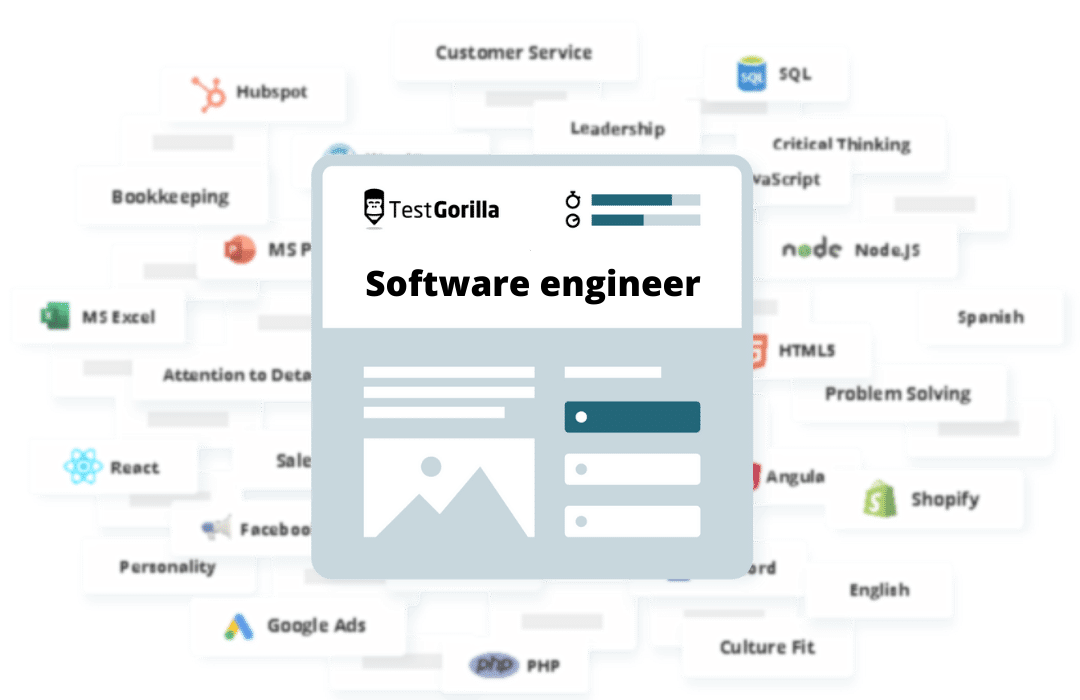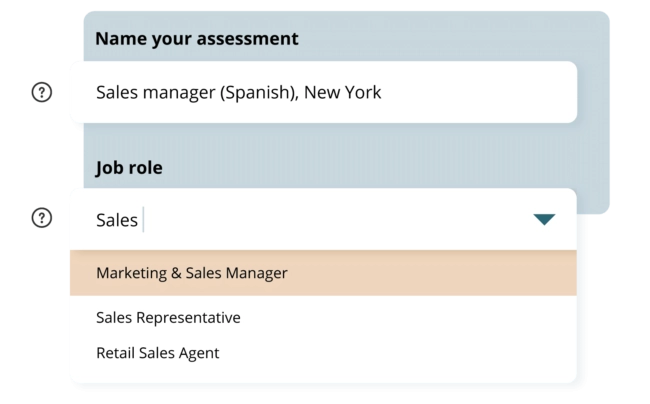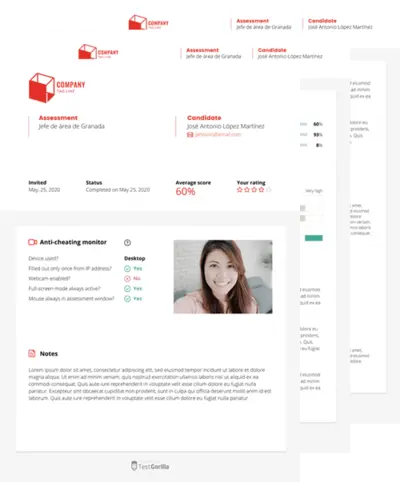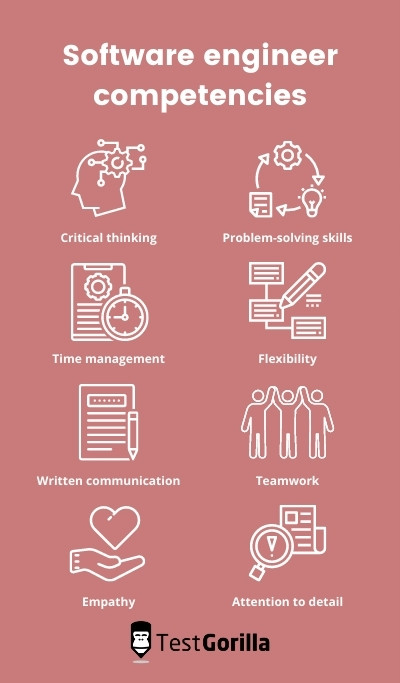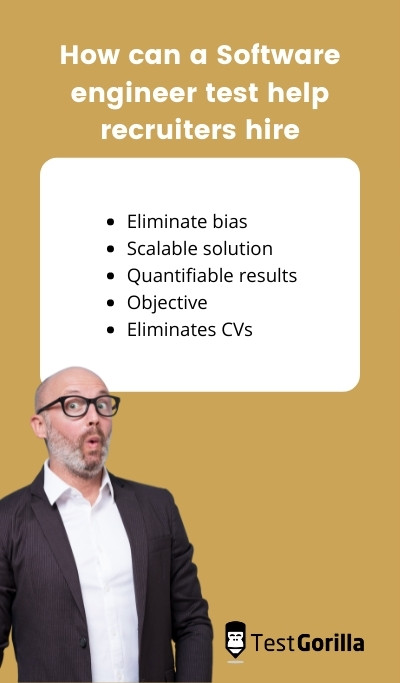Software engineer test: Pre-employment screening assessment to hire the best candidates
Summary of the Software engineer test
This software engineer test evaluates candidates’ knowledge of the basic principles and topics of software engineering. The test helps you identify candidates who can approach problems using “software engineer thinking” to find the best solution possible.
Covered skills
Linear data structures
Non-linear data structures
Algorithm analysis
Computer science fundamentals
Use the Software engineer test to hire
Software engineers
Type
Time
Languages
Level
About the Software engineer test
A programming language is only a means of communication and not an end in itself. A programming language determines how one communicates ideas to the computer, but those ideas exist at a deeper level, independent of any specific language. To fully grasp ideas and be able to translate them into a programming language that a machine can understand, a software engineer must first understand the basics of computer science and data structures.
This software engineer test assesses candidates’ understanding of the fundamentals of computer science and their knowledge of linear data structures, non-linear data structures, and algorithms that lie at the heart of all software, without focusing on any one language in particular. The test evaluates how well candidates can assess the complexity of a given algorithm and their ability to determine the quality of different algorithmic solutions.
Candidates who perform well on this test have a good understanding of the fundamentals of computer science, software design principles, and analysis of algorithms. The test ensures that these candidates have all the technical skills needed to implement your company’s vision into bits and bytes.
The test is made by a subject-matter expert
Yashavant K.
Over the last 25 years, Yashavant has published numerous books and online courses in C, C++, Data Structures, VC++, .NET, and Embedded Systems. A sought-after speaker, Yashavant has given presentations and workshops at TedEx, IITs, NITs, IIITs, and global software companies. In recognition of his contribution to IT education, he has been awarded the "Best .NET Technical Contributor" and "Most Valuable Professional" awards by Microsoft and the “Distinguished Alumnus Award” by IIT Kanpur.
Crafted with expert knowledge
TestGorilla’s tests are created by subject matter experts. We assess potential subject-matter experts based on their knowledge, ability, and reputation. Before being published, each test is peer-reviewed by another expert, then calibrated using hundreds of test takers with relevant experience in the subject. Our feedback mechanisms and unique algorithms allow our subject-matter experts to constantly improve their tests.
What our customers are saying
TestGorilla helps me to assess engineers rapidly. Creating assessments for different positions is easy due to pre-existing templates. You can create an assessment in less than 2 minutes. The interface is intuitive and it’s easy to visualize results per assessment.
David Felipe C.
VP of Engineering, Mid-Market (51-1000 emp.)

Any tool can have functions—bells and whistles. Not every tool comes armed with staff passionate about making the user experience positive.
The TestGorilla team only offers useful insights to user challenges, they engage in conversation.
For instance, I recently asked a question about a Python test I intended to implement. Instead of receiving “oh, that test would work perfectly for your solution,” or, “at this time we’re thinking about implementing a solution that may or may not…” I received a direct and straightforward answer with additional thoughts to help shape the solution.
I hope that TestGorilla realizes the value proposition in their work is not only the platform but the type of support that’s provided.
For a bit of context—I am a diversity recruiter trying to create a platform that removes bias from the hiring process and encourages the discovery of new and unseen talent.
David B.
Chief Talent Connector, Small-Business (50 or fewer emp.)

Use TestGorilla to hire the best faster, easier and bias-free
Our screening tests identify the best candidates and make your hiring decisions faster, easier, and bias-free.
Watch what TestGorilla can do for you
Create high-quality assessments, fast
Building assessments is a breeze with TestGorilla. Get started with these simple steps.
View a sample report
The Software engineer test will be included in a PDF report along with the other tests from your assessment. You can easily download and share this report with colleagues and candidates.
Why you should recruit with a Software engineer test
The software engineer test helps your hiring manager determine which candidates have the necessary skills to succeed in the open job role.
The test will help the recruiters identify problems and figure out the best solutions to those problems using “software engineer thinking.”
A person who’s a software engineer will be called many roles such as system developer, software developer, web programmer, etc. But the main division is the following:
• Systems developers• Application developers
System developers will usually work on creating computer systems, while application developers will work with applications used by customers (such as iOS or Android applications).
A software engineer will also create, maintain, and audit systems to ensure they work optimally, meet the organizational demands, and test systems to find their faults.
A software developer/engineer will also write code… a lot of code. That’s why you will also see some job openings that ask for a software engineer who has experience in a specific programming language. You will often find companies searching for developers who know how to work in: Python, JavaScript, Java, C# (C Sharp), C, C++, Go, R, Swift, PHP, HTML, Ruby (especially Ruby on Rails), Kotlin, Dart, and MATLAB.
Software engineer competencies for candidates
A software engineer needs to have various skills to be competent and succeed in their job.
Technical (coding) skills are a must and experience working in any of the above-mentioned programming languages can help the software engineer excel at their job. But the software developer needs to continue growing and learning since programming languages are changing, and they need to stay up-to-par with changes to be relevant in today’s marketplace.
Coding iOS or Android applications started a bit more than 10 years ago and today you can find hundreds of job listings that search for developers with those skills. Not to mention that the programming languages rise and fall through the years as new programming languages arrive that are faster, have better performance, and integrate more efficiently with other languages. So a software engineer needs to keep learning to stay relevant in the field.
Software engineer competencies for candidates
A software engineer needs to have various skills to be competent and succeed in their job.
Technical (coding) skills are a must and experience working in any of the above-mentioned programming languages can help the software engineer excel at their job. But the software developer needs to continue growing and learning since programming languages are changing, and they need to stay up-to-par with changes to be relevant in today’s marketplace.
Coding iOS or Android applications started a bit more than 10 years ago and today you can find hundreds of job listings that search for developers with those skills. Not to mention that the programming languages rise and fall through the years as new programming languages arrive that are faster, have better performance, and integrate more efficiently with other languages. So a software engineer needs to keep learning to stay relevant in the field.
The right candidate
The right candidate for a software engineer position will have the following skills:
• Critical thinking skills. The software developer will have to analyze and systemize data, reason and make sense of it, and apply the solutions to the problems at hand.
• Problem-solving skills. Software engineers will often find themselves in a situation where they will have to figure out a solution to the problem - and do it fast. So a great software developer will handle problems with a “can-do” attitude.
• Time management. Coding isn’t an easy task and often the software engineers are under a tight deadline to finish up the applications or get the system back up and running. So they will need excellent time management skills.
• Flexibility. When it comes to programming, a software engineer will try to actively find a solution to the problem. If the problem can’t be fixed through one framework, they will try a different approach until they solve the problem. That’s why coding is also quite creative.
• Written communication skills. A perfect software engineer would also have good verbal communication skills, but software engineers usually lack these skills. But having great written communication is a must for software engineers because they will have to communicate things with their colleagues.
• Teamwork. Software engineers often do pair programming, so they will have to be collaborative and get along well with others to succeed in their roles.
• Empathy. Since software engineers work in teams and do pair programming, they will have to understand why their colleagues did something the way they did. That will require the software engineer to put themselves in others’ shoes and understand their point of view. That’s why empathy is a good skill for a software engineer.
• Attention to detail. Missing a comma in the English language will get you a faulty sentence, but missing a comma in C++ will invalidate your code (macros, variable declarations, enum declarations, and similar constructs). So a software engineer needs to be detail-oriented if they want to succeed in their role.
On top of these soft skills, the software engineer will also know how to:
• Work with NoSQL and SQL databases• Understand computer architecture• Have experience with operating systems• Be well-versed in product enhancement, optimization, and strategic planning• Have experience with data structures• Have a working knowledge of Linux/Unit, JS, Perl, and Shell• Be experienced with agile scrum team techniques• Have a basic understanding of UI toolkits and frameworks
By adding a software engineer test to your recruitment process, you can evaluate which applicants have the above-mentioned skills, and gain insight into who the best candidates are.
How can a Software engineer test help recruiters hire
When you use a pre-employment test such as the software engineer test, you give all of your applicants a chance to prove their worth only with their skills.
As a hiring manager, using a pre-employment test can be beneficial for you:
• Eliminate bias. With a pre-employment test, you eliminate biases from your hiring process. When you give your candidates a test, they all receive the same test and the results won’t be impacted by the possibility of the hiring manager’s bias.
• Scalable solution. A pre-employment test is a scalable solution for the hiring manager. It doesn’t matter if they receive 50 or 500 applications for their open role; they simply send the tests with a single click and wait for results.
• Quantifiable results. With TestGorilla’s software engineer test, you will receive quantifiable (numerical) results. That will help you compare the candidate’s scores with ease.
• Objective. And the results of the pre-employment tests are objective. If you give your candidates the test, you will ensure that biases won’t play a role and that they will be scored only on their test results.
• Eliminates CVs. A software engineer test focuses on skills proficiency and eliminates the need to sift through CVs. By using TestGorilla’s scientifically validated pre-employment tests, you can streamline your recruitment process and hire the right candidate faster.
In summary
A software engineer goes by many different names in the hiring process: web developer, C++ programming expert, software developer, etc. But no matter what the official title of the role is, you should use a pre-employment software engineer test to evaluate your applicants’ skills.
With a software engineer test, you’re creating a bias-free hiring process and using data to evaluate your candidates to find the best possible candidate.
FAQs
Related tests
AI Product Manager
Computer Networking Fundamentals
LinkedIn Advertising
Design Thinking
International Trade Law
Data Storytelling
Shift Coordination
Training and Development
Pharmacist
HIPAA

